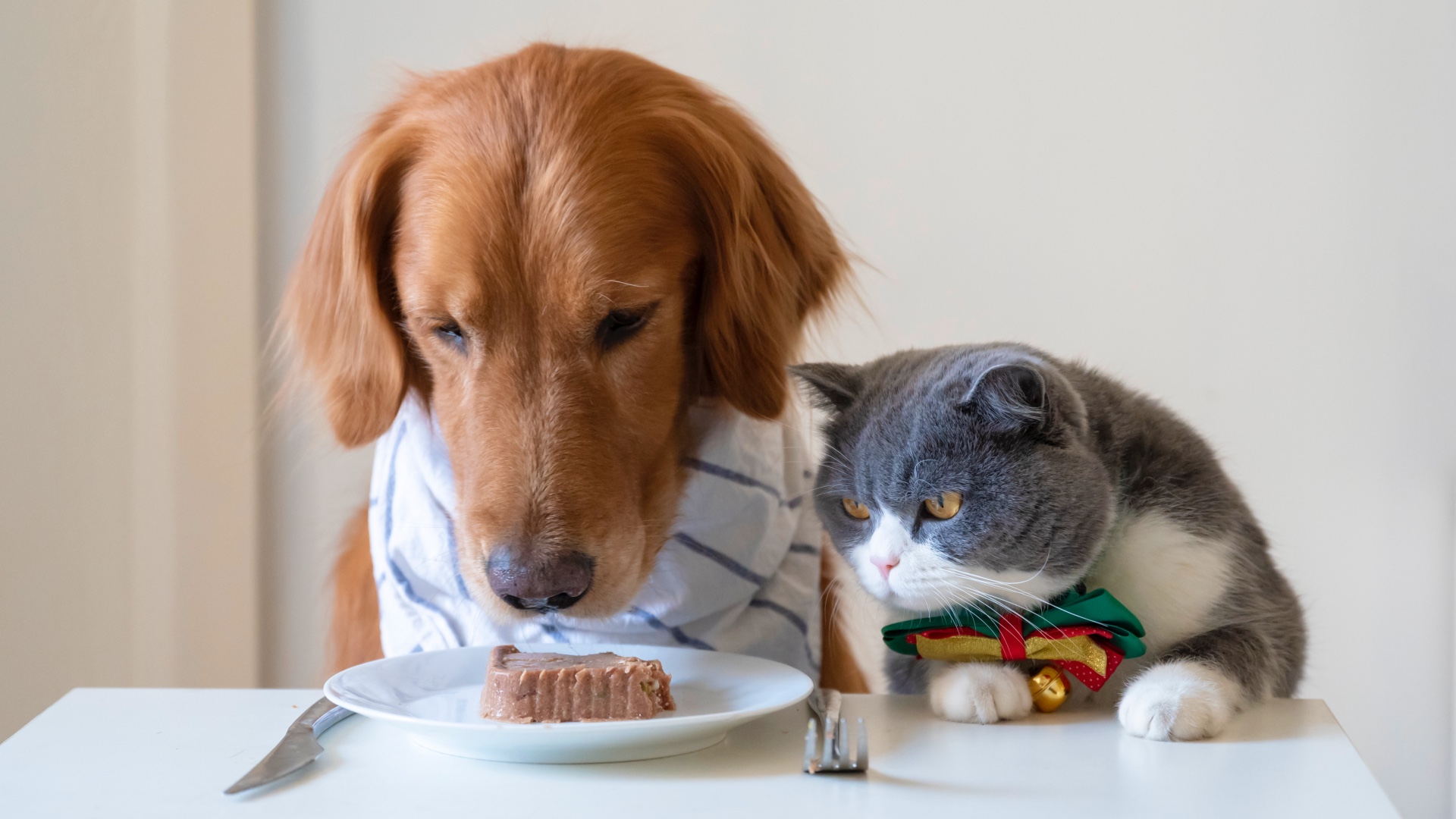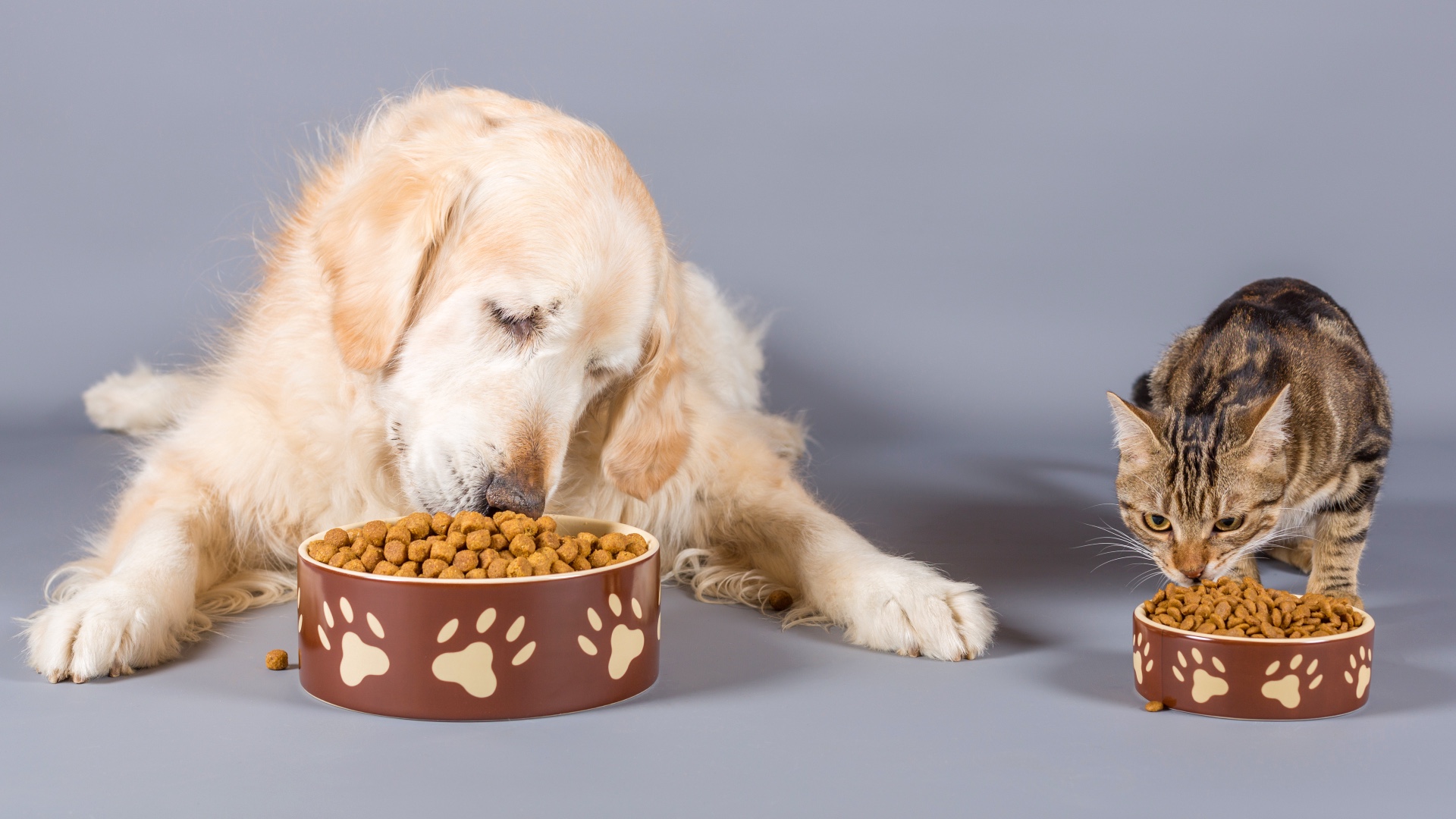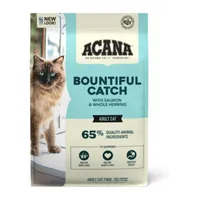Can cats eat dog food? A vet's guide to whether dog food is bad for cats
Questioning, ‘Can cats eat dog food?’ Our vet has the answer…

Get the best advice, tips and top tech for your beloved Pets
You are now subscribed
Your newsletter sign-up was successful
Have you ever wondered, ‘Can cats eat dog food?’ If you’re lucky enough to be the guardian of both a cat and a dog, then you might be tempted to feed them the same food to make things easier.
Whilst their food doesn’t look too different on the outside, the nutrition inside is not the same, so it’s important to feed your feline the best cat food instead. The same goes for your pooch, who should stick to the best dog food only.
However, if you’re in an emergency where you can’t go to the shops, or your cat has accidentally eaten some, you might want to find out if it’s fine in moderation. Our expert vet Dr. Joanna Woodnutt answers below. She also explains what would happen if they ate it and how to stop your cat from stealing your dog’s dinner:
Is it safe to feed dog food to cats?
Cat food and dog food may look similar, but there are key differences in their ingredients. This is because cats and dogs have different nutritional needs, so cats shouldn’t eat dog food, and vice versa.
What’s so different about cat and dog food? Well, cats are ‘obligate carnivores’ — they cannot survive without meat in their diet. That’s because of an amino acid called taurine that isn’t found in plants, but is found in meat. Whilst canines (and humans) can make their own taurine from other amino acids like methionine, cats cannot. If they don’t eat enough taurine, they quickly have severe effects. Cat food therefore always has plenty of bioavailable taurine, whilst dog food may have it, or may not, or may have it in only small amounts. There are other differences too – cat food generally has a higher protein content and higher amounts of the amino acid alanine.
Because of these key differences in the nutrient content of cat and dog foods, dog food is not safe for cats. Cats that eat wet or the best dry dog food won’t be getting the required amount of taurine, alanine, and protein. Taurine deficiency in cats causes blindness and heart disease that is quickly fatal.
ACANA Bountiful Catch High-Protein Adult Dry Cat Food
On the hunt for good-quality cat food? Acana Bountiful Catch is high in protein, containing wild-caught whole herring, responsibly farmed salmon, catfish, and trout. The recipe includes fiber, probiotics, taurine, EPA, and DHA, which are all great for maintaining your cat’s health. You won't find any artificial flavors, colors, or preservatives inside.
Can cats eat dog food minimally or in an emergency?
If your cat occasionally snacks from the dog food bowl but mainly eats cat food, this is ok. As long as a complete and balanced cat food makes up 90% of their daily calories, it’s ok for cats to have a small amount of dog food occasionally. Dog food does not usually contain ingredients that are toxic to cats, so short-term, dog food will not hurt a cat. They should be fine if you walk in to find the cat eating the dog food – as long as it doesn’t become a regular occurrence.
Get the best advice, tips and top tech for your beloved Pets
Similarly, in an emergency, and for less than 24 hours, it would be ok to feed dog food to cats. As long as they’re fed a complete and balanced cat food as soon as possible, they’ll be able to absorb their dose of taurine before the deficiency starts to cause problems. However, it would be sensible to ensure this doesn’t happen too often, and that you don’t feed your cat dog food for more than 24 hours – this is really an emergency-only, empty-cupboard, store-closed situation, not a way to use up leftover dog food!

If it’s so bad, why do cats eat dog food?
Just like humans, cats don’t always know what’s good for them, and many will happily tuck into a bowl of dog food. Some might simply like the variety – cats seem to be fussier and more easily bored by their food than their canine counterparts. Other cats might prefer the flavour or texture of the dog food.
Lastly, some cats are just greedy. They’ll quite happily finish their bowl of food and scout around for anything else within reach. If it’s unusual for your cat to be greedy, it might be worth talking to your vet. An increased appetite (called ‘polyphagia’) is a symptom of hyperthyroidism and of diabetes, both of which need medical attention before they cause more severe symptoms.
How to stop a cat eating dog food
To stop a cat from eating dog food, it’s a good idea to feed your pets separately. Your dog can be fed in a crate, or in a separate room with the door closed, until all the food is gone. Most vets advise against leaving dog food down all day as it makes obesity more likely. Instead, you should remove any food your dog hasn’t eaten after half an hour, and put it down again later. This will also stop your cat eating the dog’s food.
What happens if a dog eats cat food?
It’s much safer for dogs to eat cat food than the other way around, and there’s nothing toxic in cat food that could cause problems to your dog. However, it’s not necessarily good for them. Cat food is much higher in protein and fat than most dogs are used to – this can cause pancreatitis, gut upset, and put them at risk for obesity.
It’s best not to feed cat food to your dog, and take steps to avoid your dog eating cat food whenever possible. However, if your dog manages to get hold of some cat food — don’t panic! Watch out for signs of gut problems, and take them to the vet if they seem unwell.
So, the answer to ‘can cats eat dog food’ is both yes and no. Dog food is not safe for long-term feeding to a cat because it doesn’t contain the right nutrients. However, occasional snacking on dog food, or cats eating dog food in an emergency, is unlikely to cause problems. Just don’t let it become a regular occurrence!
Enjoyed this? You might also find helpful: 5 ways to improve your cat’s diet and can dogs eat cat food? Or, Can cats eat strawberries?
After graduating as a vet from the University of Nottingham in 2016, Dr. Joanna Woodnutt went on to practice companion animal medicine in the Midlands. She quickly developed a love of consulting and helping clients with medical problems such as dermatology, behavior and nutrition - anything that involved helping clients understand their pets better.
Jo started writing about pet health in 2017, realizing that it meant she could help even more pet parents. Since then, she has written for countless online and print publications and is a regular contributor for Edition Dog Magazine. Jo is the director of The Veterinary Content Company, which she founded in 2020. She is also the founder of Petlearnia, a platform that provides pet e-learning courses for pet parents.
Jo now lives in the Channel Islands with her husband Ian and terrier Pixie.
- Megan MilsteadStaff Writer


